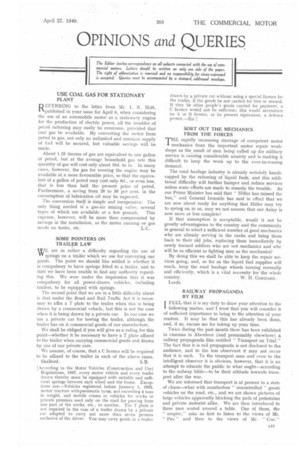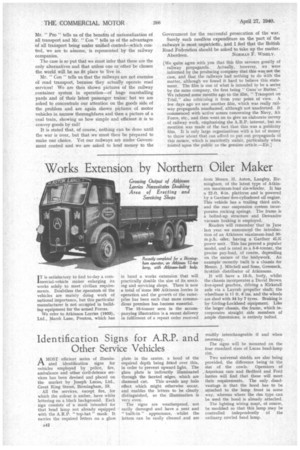OPINIONS and QUERIES USE COAL GAS FOR STATIONARY PLANT EFERRING
Page 43

Page 44

If you've noticed an error in this article please click here to report it so we can fix it.
to the letter from Mr. I. R. Holt, I %published in your issue for April 6, when considering the use of an automobile. motor as a stationary engine for the production of electric power, all the troubles of petrol rationing may easily be overcome, provided that coal gas be available. By converting the motor from petrol to gas, not only an unlimited and constant supply of fuel will be secured, but valuable savings will be made.
About 1.25 therms of gas are equivalent to one gallon of petrol, but at the average household gas rate this quantity of gas will cost only about 10d. to ls. In many cases, however, the gas for running the engine may be available at a more favourable price, so that the equivalent of a gallon of petrol may cost only 8d., or even less, that is less than half the present price of petrol. Furthermore, a saving from 20 to 30 per cent. in the consumption of lubrication oil may be expected.
The conversion itself is simple and inexpensive. The only thing needed is' a gas-air mixing valve, several types of which are available at a few pounds. This expense, however, will be more than compensated by savings in the installation, as the motor running on gas needs no tanks, etc.. L.C.
SOME POINTERS ON TRAILER LAW WE are in rather a difficulty regarding the use of springs on a trailer which we use for conveying our goods. The point we should like settled is whether it is compulsory to have springs fitted to a trailer, and to date we have been unable to find any authority regarding this. We were under the impression that it was compulsory for all power-drawn vehicles, including trailers, to be equipped with springs.
The second point that we are in a little difficulty about is that under the Road and Rail Traffic Act it is necessary to affix a T plate to the trailer when this is being drawn by a commercial vehicle, but this is not the case when it is being drawn by a private car. In our case we use a private car for towing the trailer, although the trailer has on it commercial goods of our manufacture.
We shall be obliged if you will give us a ruling for this point—whether it be necessary to have a T plate affixed to the trailer when carrying commercial goods and drawn by one of our private cars.
We assume, of course, that a C licence will be required to be affixed to the trailer in each of the above cases.
Shalford. S.13.
[According to the Motor Vehicles (Construction and Use) Regulations, 1937, every motor vehicle and every trailer drawn thereby must be equipped with suitable and sufficient springs between each wheel and the frame. Exceptions are:—Vehicles registered before January 1, 1932. motor tractors with pneumatic tyres, not exceeding 4 tons in weight, and mobile cranes or vehicles for works or private premises used only on the road for passing from one part of the works, etc., to another. The T plate is not required in the case of a trailer drawn by a private car adapted to carry not more than seven persons exclusive of the driver. You may carry goods in a trailer
drawn i by a private car without using a special licence for the trailer, if the' goods be not carried for hire or reward. If they be other people's goods carried for payment, a C licence would not be sufficient; this would necessitate an A or 13 licence, or its present equivalent, a defence permit.—En.] SORT OUT THE MECHANICS FROM THE FORCES
THE rapidly increasing shortage of competent motor
mechanics from the important motor repair workshops as the result of men being called up for military service is causing considerable anxiety and is making it difficult to keep the work up to the ever-increasing demand.
The road haulage industry is already serioUsly handicapped by the rationing of liquid fuels, and this additional difficulty will further hamper and reduce services unless some efforts are made to remedy the trouble. As our Prime Minister has said that " Hitler has missed the bus," and General Ironside has said in effect that We are now about ready for anything that Hitler may try to spring on to us, may we not assume that our Army is now more or less complete?
If that assumption is acceptable, would it not be greatly advantageous to the country and the community in general to select a sufficient number of good mechanics who are already serving in the ranks and bring them back to their old jobs, replacing them immediately by newly trained soldiers who are not mechanics and whe will be as efficient as fighting men as the mechanics?
By doing this we shall be able to keep the repair services going, and, so far as the liquid fuel supplies will reach, keep the road haulage wheels turning normally and efficiently, which is a vital necessity for the whole
country. W. H. GODDARD.
Leeds. RAILWAY PROPAGANDA BY FILM
I FEEL that it is my duty to draw your attention to the I following matter, and I trust that you will consider it of sufficient importance to bring to the attention of your
readers. It may be that this has already been done, and, if so, excuse me for taking up your time.
Twice during the past month there has been exhibited in cinemas in Aberdeen (and presumably elsewhere) a railway propaganda film entitled " Transport on Trial." The fact that it is rail propaganda is not disclosed to the audience, and to the less observant it may not occur that it is such. To the transport man and even 'to the intelligent observer it is obvious, however, that it is an
attempt to educate the public to what ought—according to the railway bible—to be their attitude towards trans port after the war.
We are informed that transport is at present in a state of chaos—what with numberless " uncontrolled " goods vehicles on the road, etc., and we are shown pictures of large vehicles apparently blocking the path of pedestrian and private motorist alike. We are then introduced to
three men seated around a table. One of them, the "umpire," asks us first to listen to the views of Mr. " Pro " and then to the views of Mr. "Con." Mr. " Pro" tells us of the benefits of nationalization of all transport and Mr. " Con" tells us of the advantages of all transport being under unified control—which control, we are to aisume, is represented by the railway companies.
The case is so put that we must infer that these are the only alternatives and that unless one or other be chosen the world will be no fit place to live in.
Mr. " Con " tells us that the railways are not enemies of road transport, because they actually operate road services! We are then shown pictures of the railway container system in operation—of huge marshalling yards and of their latest passenger trains; but we are asked to concentrate our attention on the goods side of the problem and are again shown pictures of motor vehicles in narrow thoroughfares and then a picture of a coal train, showing us how simple and efficient it is to convey goods by rail!
It is stated that, of course, nothing can be done until the war is over, but that we must then be prepared to make our choice. Yet our railways are under Government control and we are asked to lend money to the Government for the successful prosecution of the war. Surely such needless expenditure on the part of the railways is most unpatriotic, and I feel that the British Road Federation should be asked to take up the matter.
Aberdeen. NORMAN F. WISELY.
[We quite agree with you that this film savours greatly of railway propaganda. Actually, however, we were informed by the producing company that this was not the case, and that the railways had nothing to do with the matter, although we found it bard to believe this statement. The film is one of what is intended to be a series by the same company, the first being "Guns or Butter." We referred some months ago to the film, "Transport on Trial," also criticizing it from your point of view. A few days ago we saw another film, which was really railway propaganda unashamed, although not unadorned. It commenced with active scenes concerning the Navy, An Force, etc., and then went on to give an elaborate survey of railway work, emphasizing the A.R.P. interest, but no mention was made of the fact that this was a publicity film. It is only large organizations with a lot of money to throw about that can afford to put out propaganda of this nature, which is manifestly unfair, particularly when foisted upon the public as the genuine article.—En.]




































































